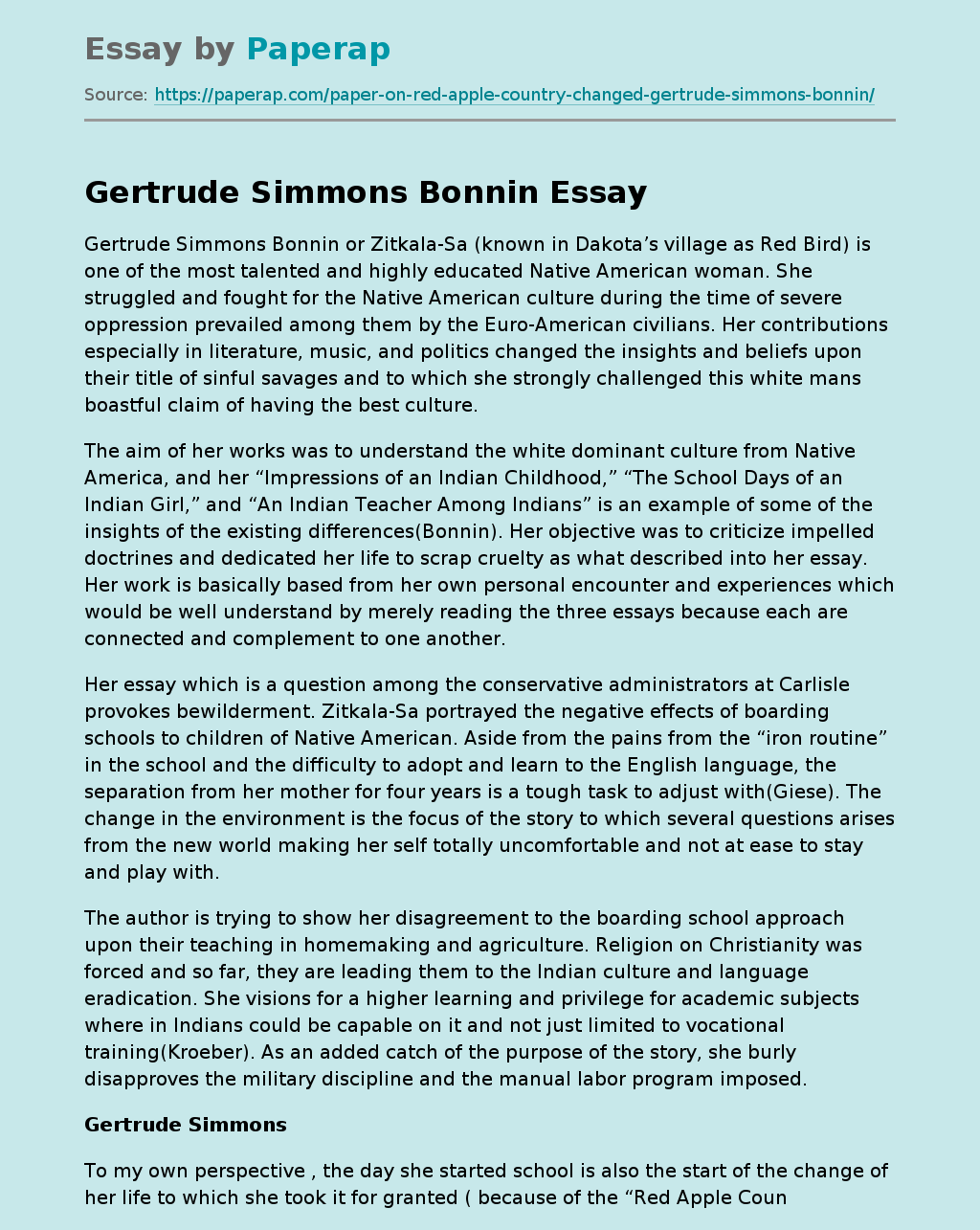Gertrude Simmons Bonnin
Gertrude Simmons Bonnin or Zitkala-Sa (known in Dakota’s village as Red Bird) is one of the most talented and highly educated Native American woman. She struggled and fought for the Native American culture during the time of severe oppression prevailed among them by the Euro-American civilians. Her contributions especially in literature, music, and politics changed the insights and beliefs upon their title of sinful savages and to which she strongly challenged this white mans boastful claim of having the best culture.
The aim of her works was to understand the white dominant culture from Native America, and her “Impressions of an Indian Childhood,” “The School Days of an Indian Girl,” and “An Indian Teacher Among Indians” is an example of some of the insights of the existing differences(Bonnin). Her objective was to criticize impelled doctrines and dedicated her life to scrap cruelty as what described into her essay. Her work is basically based from her own personal encounter and experiences which would be well understand by merely reading the three essays because each are connected and complement to one another.
Her essay which is a question among the conservative administrators at Carlisle provokes bewilderment. Zitkala-Sa portrayed the negative effects of boarding schools to children of Native American. Aside from the pains from the “iron routine” in the school and the difficulty to adopt and learn to the English language, the separation from her mother for four years is a tough task to adjust with(Giese). The change in the environment is the focus of the story to which several questions arises from the new world making her self totally uncomfortable and not at ease to stay and play with.
The author is trying to show her disagreement to the boarding school approach upon their teaching in homemaking and agriculture. Religion on Christianity was forced and so far, they are leading them to the Indian culture and language eradication. She visions for a higher learning and privilege for academic subjects where in Indians could be capable on it and not just limited to vocational training(Kroeber). As an added catch of the purpose of the story, she burly disapproves the military discipline and the manual labor program imposed.
Gertrude Simmons
To my own perspective , the day she started school is also the start of the change of her life to which she took it for granted ( because of the “Red Apple Country), for at a younger age her destiny begins even though still unconscious of it. Schooling means to the Euro-American is civilization and survival, so that’s what she grabbed because the sooner or later if no one among them will be intelligent enough to analyze the minds of this Euro-American, they will be just a subordinate to them, making them aliens or worst slaves of their own region(Minnesota).
From the words of the author she mentioned that, “I give outright the varying moods of my own evolution, those growing pains which knew not reason while active, to stir up views and earnest comparisons of theories was one of the ways in which I hoped it would work a benefit to my people, no one can dispute my own impressions and bitterness and perhaps a reason may be assigned to” (Minnesota).
So, she then clearly emphasized the bitterness and hatred of the Euro-American cultures in condemning their rights specially those days at school that is vastly different from the world they are supposed to be wandering, also a different views that compel to them for not being treated as equally to the kids of the new community they went for.
Gertrude Simmons Bonnin. (2019, Dec 05). Retrieved from https://paperap.com/paper-on-red-apple-country-changed-gertrude-simmons-bonnin/

